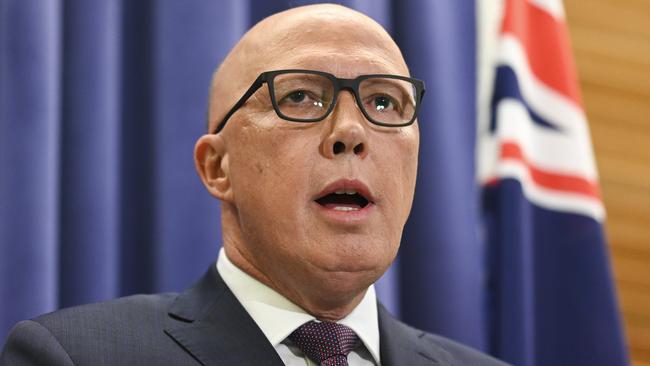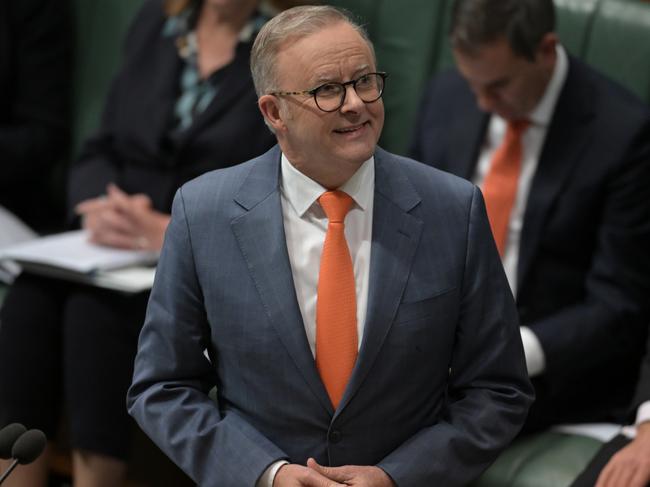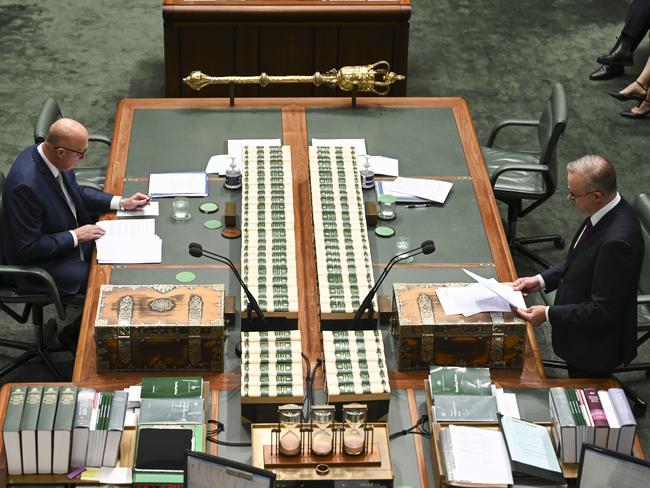Opinion: Dutton failing to land a blow on mediocre Albanese
After his Voice victory Peter Dutton is now failing to outpace an average-performing Anthony Albanese, writes Paul Williams.

Opinion
Don't miss out on the headlines from Opinion. Followed categories will be added to My News.
Ask a friend what federal Liberal leader Peter Dutton has done – or at least stood for – since assuming the Opposition leadership two-and-a-half years ago and you’ll likely get one of three responses.
The first will probably be “I don’t know”. The second might well be “he stopped the Voice to Parliament” (unpopular with 60 per cent of the nation), while a third could be “he wants nuclear power”.
Dutton’s clever “no” campaign was indeed a textbook study of how to undermine a prime minister while also sinking a referendum. It was that aggressive approach that breathed life into an Opposition Leader potentially facing a party room spill. But that’s old history. In politics, like football, you’re only as good as your last game.
This year, Dutton tried to regain that momentum with a bold nuclear energy option designed more for good politics than good policy. Looking for an energy solution somewhere between coal (where there are too few votes) and Labor’s clean energy program (Dutton cannot be seen to duplicate Labor), the Liberal leader took the crazy-brave option.
And for a while it looked like the risk paid off. Not only did early opinion polls show healthy support for nuclear energy, the policy threatened to wedge a Labor Party confident it had long settled its own internal nuclear debate 40 years ago.

But recent developments are threatening to quell Dutton’s atomic dream. First, a June Resolve poll found 43 per cent of Australians preferred a “clean energy plus gas” option, compared with just 33 per cent preferring a “nuclear plus gas” policy. Indeed, women voters (already a weak demographic for Dutton) disapproved of nuclear energy far more than men, with just 7 per cent being very supportive. The only constituency wildly enthusiastic about uranium was the wealthy voter aged over 65 years – already a rusted-on Coalition supporter.
Worse for the Liberals – already under fire for not releasing the eye-watering cost of constructing seven nuclear reactors by 2035 – the Institute for Energy Economics and Financial Analysis (a respected American think-tank) found a nuclear option would cost each Australian household, on average, an extra $665 each year to pay for very expensive reactors which may not come online till 2040.
The point is plain: Dutton has scored too few hits since his referendum victory last year, and Coalition strategists are nonplussed their very savvy leader is not streets ahead of an average-performing prime minister, overseeing the worst cost-of-living crisis in a generation, just eight months out from an election.
Put bluntly, Dutton needs to do more than fight silly culture wars – attacking an allegedly “woke” Woolworths, and blaming Albo for the High Court’s decision to release refugees – that Middle Australia (including Teal voters in leafy seats) care nothing about.
In short, Dutton needs a new but credible circuit-breaker to steal back the media and policy agenda.

Opinion polls bear this out. Last week’s Newspoll had Albanese (with a dismal negative eight-point approval rating) leading Dutton (on an even worse negative 15) as preferred prime minister, 46 to 37 per cent. Party support is better for the Coalition, with the opposition’s primary vote up three points (to 38), and Labor’s down one point (to 31), since the 2022 election.
With the parties tied 50-50 after preferences, Labor would lose just seven seats for a new total 71 in what will be a 150-seat House of Representatives – five seats short of a majority. If an election were held tomorrow, Albanese would form minority government with five of the seven Teals, and happily turn his back on the Greens who have obstructed Labor’s “Help to Buy” housing Bill in the Senate. (Anecdotally, the Greens’ intransigence on housing is unpopular with swinging voters, and that could see the Greens’ vote plateau, or even fall, next year).
The urgency for Dutton is even more pronounced when we consider the economy, a traditional Coalition strength. With annual inflation falling last month to just 2.7 per cent – well within the Reserve Bank’s Goldilocks zone of 2 to 3 per cent – we can expect several cuts to interest rates before a May election, with the first cut as early as November.
When grocery prices also stabilise, Australians will have their top two election issues assuaged, leaving little room for Dutton to attack Labor on economic management.
With the Coalition’s chances of forming government next year at virtually zero, Liberal strategists would be better placed finding a leader and a policy platform relevant to a Middle Australia living in 2028.
Paul Williams is an associate professor at Griffith University




